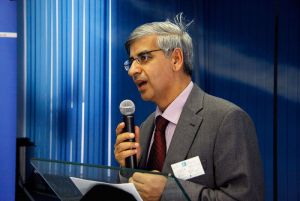„New globalization“ and media studies
April 28, 2014
 On April 25 the second International conference «Comparative media studies in today's world: journalism cultures in various socio-political contexts» took place at Saint Petersburg State University. The conference was organized with the support of German Houses of Research and Innovation and Centre for German and European Studies (SPbU – Bielefeld University).
On April 25 the second International conference «Comparative media studies in today's world: journalism cultures in various socio-political contexts» took place at Saint Petersburg State University. The conference was organized with the support of German Houses of Research and Innovation and Centre for German and European Studies (SPbU – Bielefeld University).
It was held within the framework of the 53th international conference “Media in today’s world. Petersburg Readings” – one of the biggest events in the area of journalism and mass communications in Russia. More than 200 researchers and experts from different countries become participants of the conference every year.
“In today’s world it’s important not just to research media system itself, for example, the Russian or the British one but to compare, to find global tendencie, at the same time paying attention to the national framework”, , the head of the program committee of the conference Anna Litvinenko said.
Among the researchers who presented their research at the conference were Thomas Hanitzsch (Germany), Barbara Thomass (Germany), Daya Thussu (UK), Michal Glowacki (Poland), Jukka Pietiläinen (Finland) and their Russian colleagues from Saint Petersburg State University, Moscow State University and Higher School of Economics.
Comparative media studies gain a special significance in the light of “new globalization” that Daya Thussu from the University of Wesminster spoke about: “Before we talked about “anglobalization” or “americanization” of the media when the whole world just adopted Western models of media organization. But nowadays time of the “new globalization” has come. Today different models interact and influence each other”.
The conference started with the key note speech by Thomas Hanitzsch from the Ludwig Maximilian University of Munich. He talked about the results of the The Worlds of Journalism Study (WJS). “Professionalism concepts are deeply rooted in cultural context”, said Hanitzsch.
The podium discussion with Svetlana Bodrunova (SPbU) as moderator continued the program of the seminar. Representatives of two leading Russian universities as well as their colleagues from Eastern (Poland) and Western (Germany) Europe discussed problems of researching journalistic cultures of different countries. The scientists mentioned among other how fragmented today’s society was, so that difference between journalistic cultures could be traced even inside one country.
The first panel of the conference was devoted to media studies about journalistic cultures. In the next one the presentations were devoted to Russian media studies within comparative media research. For example Jukka Pietiläinen from the University of Helsinki analyzed independent media in Russian regions. The last panel was devoted to journalism functions in hybrid media systems. Galina Nikiporets-Takigawa from University of Cambridge spoke about the influence of social media on the Russian society. Nina Belyaeva from High School of Economy talked about “virtual Maidan” and the Facebооk role in the Ukrainian protests.
Thomas Hanitzsch stressed the role of comparative media studies for the international scientific community: “Engaging in comparative work helps us to foster global researchers network”.
“Next year we will definitely continue the tradition of meeting of East and West in the context of the modern media studies”, Anna Litvinenko said.
Ilya Koval
No comments yet. Be the first!


